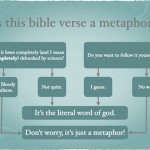Reading our Bibles (specifically, the Old Testament) in the way it is meant to be read is a much misunderstood subject in the church today. Most Christians, when pressed, will confess that they have no idea where to even start in understanding the Bible. This raises the question: how are we meant to read our Bibles? It is a great question that we need to answer, and there is a simple answer with enormous implications for how we read our Bibles. We must read God’s Word through an intentionally Christian, Christ-centered and redemptive lens.
Understanding the Old Testament through a Christ-centered lens isn’t just a random idea that someone cooked up on their own; it is actually quite a Biblical idea that we get from a proper understanding of the New Testament. Let’s take a look at two passages real quick that show us where this idea comes from.
In Luke 24, the resurrected Jesus appears to two disciples who are traveling on the road to Emmaus. Upon conversing with these two disciples for a short time, Jesus then began “with Moses and all the Prophets, he interpreted to them in all the Scriptures the things concerning himself” (Luke 24:27). Jesus himself taught that the entirety of Old Testament Scripture points to him.
Similarly, in the book of Acts Paul and Silas meet a group of Jews living in Berea. After Paul and Silas began teaching in the synagogue about Christ, the Berean Jews began to examine “the Scriptures daily to see if these things were so” (Acts 17:11). After intensely studying the Scriptures (which at the time would’ve consisted of the Old Testament Scriptures we have today), the Bible says that the Berean’s therefore believed. This therefore is important – what we can gather from this encounter with the Berean’s is that a serious reading of the Old Testament should lead us to understanding more about God’s redemptive plan through Jesus Christ.
This Christ-centered approach to reading the Old Testament – an approach that the New Testament so clearly teaches us – is often referred to as the Redemptive (or Redemptive-Historical) approach to understanding God’s Word. This is how the Bible itself teaches us to read the Old Testament. I know that this can be a real struggle for most of us. Yet, if we don’t understand the text in this way then it is reasonable for us to conclude that we are not getting everything out of the Scriptures that God himself intended for us to have. For this reason, I want to give you three tips that might help you in your Bible study as you try to understand the Scriptures in a Redemptive way.
1. Stick to the Four C’s
Comprehension: What is the meaning of this text in its original context?
Conviction: What sin problem or human need would the original audience have understood from this passage? What sin problem or need do you share with the original audience?
Consolation: How does this passage address or reveal God’s response to that sin problem or need? How is this sin problem or need ultimately met in Christ?
Compel: What am I being called to think or do in light of this passage? How does the gospel enable me to accomplish this?
2. Learn to Ask the Right Questions
- How does this passage or topic fit into the grand narrative of scripture (Creation, Fall, Redemption, Restoration)? If you’re reading the Old Testament, try to figure out where the people of God are within the history of Israel.
- What is distinctively Christian about how I am reading this passage or engaging this topic?
- Does this passage or topic point forward to the cross, backward to the cross, or forward to Christ’s return? How?
- What does this passage or topic tell me about Jesus?
- How does this passage or topic equip God’s people to live on mission?
3. Equip Yourself with a Few Good Resources
A. The ESV Study Bible: This resource is without equal, especially if you are just beginning to understand the Bible in a Redemptive way. Not only does it contain excellent verse-by-verse notes on the Bible, but it also contains excellent maps and timelines that will help you understand Redemptive history better. It also has some great short articles that cover more ground about the Redemptive approach to reading the Bible.
B. Equip yourself by reading any of these books which are concise, excellent books on this topic:
- The God who is There: Finding Your Place in God’s Story by D.A. Carson
- Jesus on Every Page by David Murray
- The Unfolding Mystery: Discovering Christ in the Old Testament by Edmund P. Clowney
C. For some more advanced reading, equip yourself with a good Systematic Theology book. The editions by Wayne Grudem or John Frame are both very good. These will help you deal with more advanced subjects and themes as you begin to see them play out in the Scriptures.



